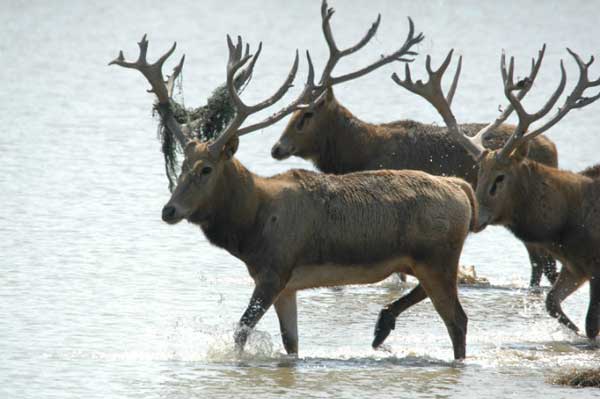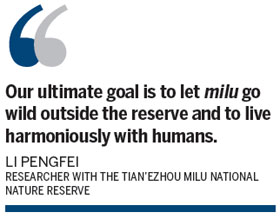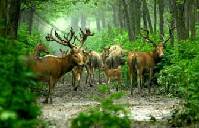Running wild
By Deng Zhangyu ( China Daily ) Updated: 2014-01-16 07:32:37
 |
|
Photo provided to China Daily |
What worries him for the final target is whether people will kill the deer and that there will be conflicts between humans and the deer when they are both struggling for their living space.
Cai Jiaqi has endeavored to increase people's awareness to protect milu for years. He says the protection awareness of villagers living nearby is decreasing, especially when the deer run from the reserve to the farmland nearby, trampling on crops and eating vegetables like carrots and cabbages. It happens when their food - water plants and grass - run low on the reserve.
Cai is concerned that people will kill the precious mammal under such circumstances.
In ancient China, milu were associated with a kingdom's power. They were often used as a metaphor for subjects in a kingdom. Emperors of different dynasties were fond of hunting them and eating the meat. Chinese traditional medicine claims milu are good for men's health.
The rarity of the animal and their use in medicine makes Cai and Li worry about how the deer will coexist with human beings. Killing the animal is punishable by jail, but the struggle for living space between man and deer is inevitable.
Years ago, miles of farmlands around the reserve were planted with reeds, says farmer Hu Shifang. Large areas of reeds provided good shelter for the animals and nurtured water plants for them to live on.
Hu and her family have lived in this area all their lives. The 60-year-old says she used to see milu on her farmlands. Several years ago, Hu started planting cotton in her fields because cotton makes more money than reeds. The other villagers followed suit.
Since cotton has taken the place of reeds, the marshes have been shrinking. The food for the deer is in shortage. It's a vicious circle, says Li.
"We're calling for more support from the government to give farmers subsidies. It's critical for the deer to go wild," Li says.
Liu Kun contributed to the story.
For more Eco China, here
|
|
|
|
|
|
|
|





























 Raymond Zhou:
Raymond Zhou: Pauline D Loh:
Pauline D Loh: Hot Pot
Hot Pot Eco China
Eco China China Dream
China Dream China Face
China Face






